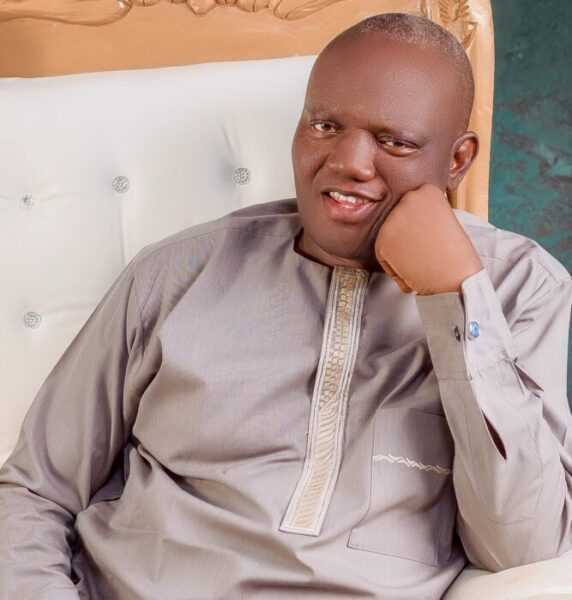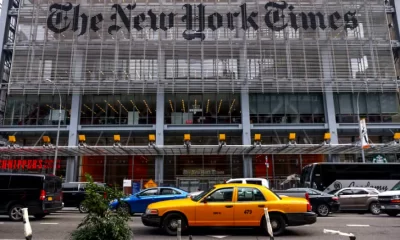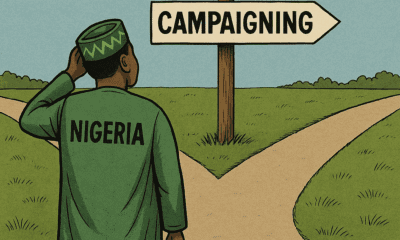Political Issues
A Tale of Two States -By Abiodun KOMOLAFE
As far as Ekiti is concerned, the political landscape suggests the government’s strategies are working. Oyebanji, a leader of discipline and direction, has demonstrated steady, determined gains. His administration has done enough to convince the Ekitis that a second term would be in their collective interest, especially since the opposition has failed to present a clear, alternative vision. Consequently, the odds clearly favour him.

Charles Dickens, in his classic novel A Tale of Two Cities, contrasted the turbulent similarities and differences of London and Paris during a time of profound change. For London and Paris, Dickens famously summed up his assessment as being “the best of times and the worst of times.”
Ekiti and Osun are currently undergoing a deep political transition, as they present both similar and contrasting situations. In Ekiti, the incumbent governor, Biodun Abayomi Oyebanji (BAO), has accomplishments to show the people and is seeking re-election. Osun, however, presents a contrasting tale!
Next year will be a buildup to the real, pivotal 2027 elections which could determine the nomenclature and the political landscape of Nigeria for decades to come. Osun and Ekiti States, like Anambra which had its own dose of electoral activity a few days ago, will be a test run, or a dress rehearsal for the real thing. In effect, Professor Joash Amupitan (SAN), the newly-appointed Chairman of the Independent National Electoral Commission (INEC), will have his feet held to the fire to demonstrate his managerial competence and transparent independence. It is going to be hard on Johnny-come-lately!
Ekiti and Osun reflect different undercurrents. In Osun State, the current governor, Ademola Adeleke, is swimming against the tide where decamping to the ruling party at the centre is no longer considered, in the editorial judgment of many would-be editors, a front-page Breaking News. Unlike Ekiti, the All Progressives Congress (APC), Osun State Chapter is arguably fragmented, appears to lack a cohesive anti-Adeleke position and the perception is that the aspirants are not offering a clear alternative manifesto to rally the state around.
In contrasting fashion, the situation is unlike that in Ekiti State. There, the current thinking among neutrals and the discerning is that the governor, despite some contrived internal wrangling, is gaining acceptance. This acceptance, largely from the non-party-affiliated electorate, suggests that a second term would allow him to conclude a steady start to his administration.
The opposition in Ekiti and the APC counterpart in Osun face a similar dilemma: how to successfully campaign to unseat the incumbent. This difficulty presents a fundamental flaw in Nigeria’s current political landscape. The flaw is that, despite the intra-party rivalry and maneuvering for party candidacy, parties often fail to develop and sell a clear, alternative prospectus to the electorate. In the absence of a viable alternative vision, this reveals ill-preparedness.
Such ill-preparedness fails to provide the necessary stimulus for voters to ride an anti-incumbent wave. History shows that nobody dethrones an incumbent without first stimulating and amplifying negative public perceptions against the current administration. This is, of course, in contrast to the national level, where the current wave of decamping and the mood of the electors unambiguously point to a solid electoral victory for the incumbent president, Bola Ahmed Tinubu.
For the opposition at the center, and in Ekiti and Osun States, it’s going to be a very steep mountain to climb. But it is climbable because the dynamics of politics is fluid; and, as the master tactician, Harold Wilson, has been quoted a million times in observing, a week is a long time in politics. However, if the current changes, we must be prepared to seize the moment!
In the case of Osun, we can ask questions such as: What does the surge in voter registration represent, what is motivating it, and who is going to gain from it? For Osun, APC should be well advised to answer these questions. The party should also look at the critical question of zoning. Will the issue of zoning become a decisive factor? Will it make political sense, leaving aside the moral question, to pick the candidate to run against Adeleke from outside of the West Senatorial District? Osun APC had better look at this critical factor before choosing its candidate and running for the election!
Osun APC should also take a realistic look at the effect of the smaller parties, such as the African Democratic Congress (ADC) and the Social Democratic Party (SDP), and their chances. Something is almost certain: wherever the Governor successfully pivots governance into a political spectacle, the PDP will most likely vote as a bloc, which means that the smaller parties might be taking votes from the APC. In our first-past-the-post electoral system, this swing in votes will be a critical factor. One can only hope that the APC already has strategists working on various permutations to counter this.
For Ekiti, the anti-incumbent people are so disparate that it is difficult to see them being galvanized on a common focus. The two states therefore represent contrasting dynamics. Events will unfold, and we intend to keep a continuing eye on the twists and turns as well as the possibility of tales of the unexpected. For instance, will the parties, after fractious primary elections, still be intact, or will there be decamping into other parties, further weakening the already unsteady party structures? These are the key issues to monitor!
As far as Ekiti is concerned, the political landscape suggests the government’s strategies are working. Oyebanji, a leader of discipline and direction, has demonstrated steady, determined gains. His administration has done enough to convince the Ekitis that a second term would be in their collective interest, especially since the opposition has failed to present a clear, alternative vision. Consequently, the odds clearly favour him.
BAO is credited with completing every General Hospital within three years and successfully connecting all Ekiti towns to the national grid. Good for the governor and the state. He must now focus on improving this transformative vision and developmental strategies, as leaders who tap effectively into the electorate’s aspirations and sense of identity tend to fare better.
Generally speaking, electoral success is often elusive for candidates who place partisan loyalty above the practical concerns and lived experiences of voters. What’s more, mere endorsements do not win elections, as the 2014 presidential election has shown. Similarly, defections alone rarely deliver victory, as the 2022 Osun governorship election has revealed. But purpose does.
Before the 2014 Osun governorship election, I asked my son, who was barely four years old at the time, the name of the then state governor. As young as he was, Abiola was able to mutter something very close to the answer I had in mind. Last year, I asked him the name of the Minister of Information as one of his birthday tests which I had promised would attract a gift. My boy started struggling with his phone! The contrast reflects the current decline in political awareness in the land.
Again, James Carville’s strategic approach in Bill Clinton’s campaign highlights the fact that Osun APC has much work to do if it aims to achieve an upset in the 2026 Osun guber election.
One of the tragedies of Osun is that the present governor is focusing largely on misplaced priorities which, unfortunately, the opposition has not done enough to capitalize on. In our very eyes, the standard of the social contract has fully collapsed, even as we are in a state of very complex ethnic and regional dynamics, and it is as if real intellectuals or names that could inspire confidence and hope are in short supply!
For example, given the lack of significant or imaginative improvement in the health and education sectors, how do we classify local government workers who have abandoned their duty posts since February 2025? Consider also the judiciary workers who have been on an industrial action with the state government practically looking away! For God’s sake, what is the percentage of the citizens of Osun State who’d never have the opportunity to become governor?
May the Lamb of God, who takes away the sin of the world, grant us peace in Nigeria!
Email: ijebujesa@yahoo.co.uk.
Mobile: 08033614419 SMS only.










